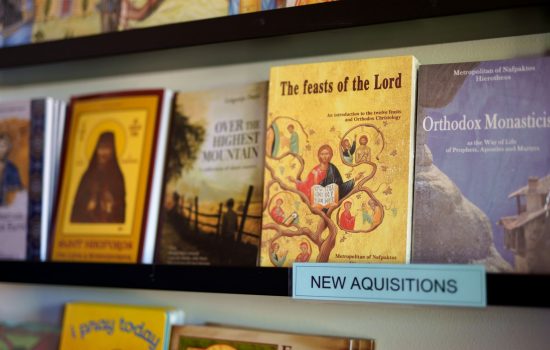It has been my recent experience to hear people proudly refer to themselves as being religious. In this state people openly and without embarrassment communicate their religious worship in a way that suggests it is synonymous with spirituality. Included in this delusion is the view that their ‘works’ are a clear sign of their righteousness.
Being ‘Religious’
Being ‘religious’ does not equate to winning God’s favour. This term is often used to describe someone who sees themselves or others to be of good character, but it does not necessarily follow that such a person has acquired any inner virtues or spiritual discipline. I have heard the term ‘religious’ even being used to describe persons who have little association with the Church. Christ’s victory calls us to celebrate and to partake in His offering. This is not possible from the convenience of our own home no matter how spiritual we might think our state to be. St Gregory Palamas (1296-1359) when he lived as a monk, committed himself to living a life of solitude, silence and prayer (hesychism) away from worldly distraction. Even he however would spend five days in the week away from others then re-emerge for the remaining two days to celebrate the Divine Liturgy with His brothers in Christ. But there are those who continue to believe that they can maintain their claim to being ‘religious’ without participating in the life of the Church, most particularly the Sacraments. These people are convinced that they are inherently good. St James said this of those who regard themselves as being religious: “If anyone among you thinks that he is religious, and does not bridle his tongue but deceives his own heart, this one’s religion is useless.” (James 1:26)
The term ‘religious’ is also often used to refer to persons who are seen to be observing the outward practices of the faith.
The keeping of religious practices such as lighting a candle, the sign of the Cross or bowing before an icon is always to be encouraged, but in themselves these practices are not the making of a Christian. It is not these outward signs of worship that make a good Christian, but through repentance we learn to serve God with all our heart and by embracing the faith from which these outward signs of worship originate. These outward signs of worship are consistent with someone who is faithful but they are not in themselves indicative of the true inner spiritual state or health of the person. Nor does serving the public good through donations or voluntary work in itself necessarily contribute or indicate a heart that is dedicated to God. A Christian is not someone of appearance but one whose internal being voluntarily turns towards God in the spirit of repentance; then and only then is it possible to learn to serve Christ to whom we depend for our salvation.
“Pure and undefiled religion before God and the Father is this” says St James, “to visit orphans and widows in their trouble, and to keep oneself unspotted from the world.” Note that St James does not refer only to the deed but also to guarding ourselves in relation to the temptations of the world.
Concealing Our Inner Life
Being Orthodox then requires us to be transformed, or rather to be made new. The new person belonging to Christ and adorned in a new spiritual garment occurs at the time of our Baptism. Our goal in life is to live up to this spiritual purity given to us at our Baptism. As we sin continually in our life, we must continuously strive to achieve the original state of this Baptismal purity by participating in the Sacrament of Confession.
Being Orthodox requires us to participate in:
1) Understanding and embracing the Truth by living a life in communion with God in Christ (salvation).
2) Participating in the Sacraments, and
3) Serving our brothers and sisters in Christ.
In doing so, we must endeavour to “conceal our inner life from casual eyes” (Ref. Archimandrite Sophrony “His Life is Mine”, Stavropegic Monastery of St John the Baptist, 1988 pp 7). Our Lord warned us that neither our prayers, good deeds, fasting or other sacrifices should be performed before others because we run the risk of receiving payment here on earth thereby being robbed of our reward in Heaven. “When you do a charitable deed” said Our Lord, “Do not let your left hand know what your right hand is doing, that your charitable deed may be in secret, and your Father who sees in secret Himself will reward you openly.” (Matt. 6:1-4) If we line ourselves up to receive earthly payment, this has the effect of cancelling out our Heavenly reward.
This is why the Saints of the Church would run away from situations which potentially could gain the recognition of others. The chief task of these holy people was to remain focused in serving God and to ‘empty themselves’ of all pride, self-purpose, self-pity, acknowledgement, self-worth and so on. Tears for themselves dried out and were replaced by tears of repentance. These are very different tears indeed. Through sacrifice and self-denial their prayer was for God’s mercy and forgiveness so that they might be granted a share in Christ’s Divinity.
God Knows Us
A further understanding of what it means to be ‘religious’ is clearly illustrated to us in the parable of the Pharisee and the tax collector. Both these two men went up to the temple to pray. The Pharisee thanked God that he was not like other men and proceeded to list all the things that set him apart from others so that he presented himself to God as a person who was just and worthy. The tax collector however would not even raise his head toward heaven asking God continuously for mercy as he knew himself to be a sinner. It was the tax collector who won God’s favour and not the Pharisee who was but a hypocrite. What we fail to do continually is to understand that God knows us through and through. He knows the very depths of our heart. There is no part of us that is hidden from him. He knows us better than we know ourselves. “He who exalts himself” says the Lord “will be humbled, and he who humbles himself will be exalted” (St Luke 18:14) Having said all that we have said, and as we approach Holy Week, we know that we will once again see the big crowds. The majority of these people have no other association with the Church apart perhaps for their attendance on Christmas day, Baptisms, Marriages and funerals. Many believe as I have heard from their own mouths, that they are ‘religious’ even for the fact that they have attended Church once or twice in the year. Let us who attend Church regularly also be on guard against complacency believing ourselves to be ‘religious’ whilst our hearts remain coldly disinterested and unrepentant.
Fr Emmanuel Stamatiou


















